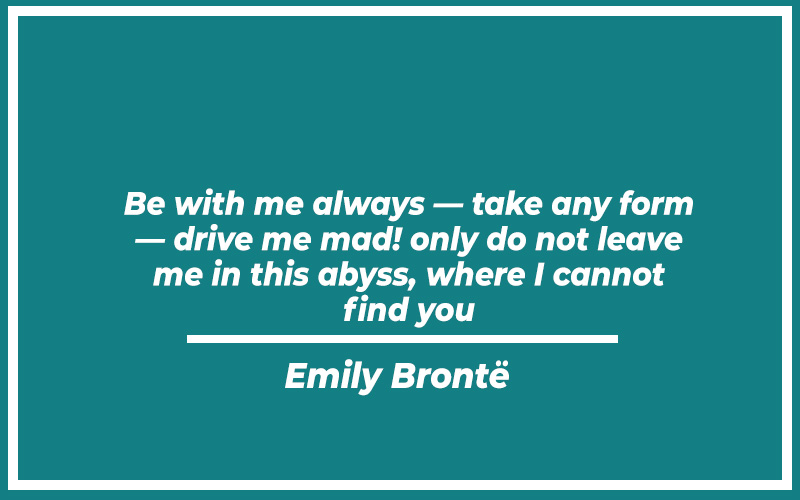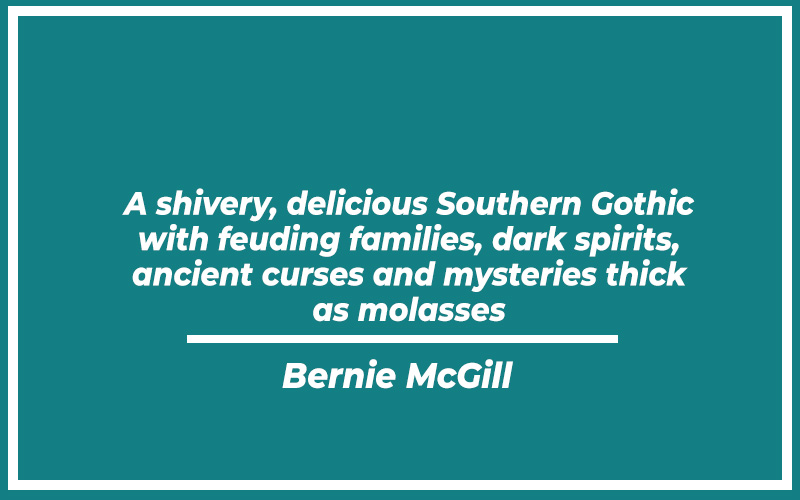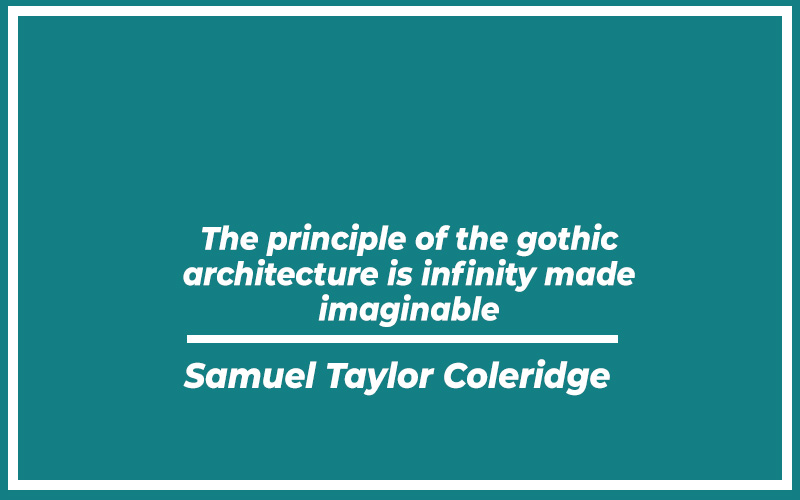The Goth subculture goes beyond just black clothes and dark makeup. It’s a way of expressing individuality and embracing a darker aesthetic. Goth music, art, and fashion often explore themes of death, beauty in the macabre, and a celebration of the outsider.
Many people resonate with Goth because it allows them to express their unique emotions and find a community that understands their perspective.
Goth Quotes

“Be with me always — take any form — drive me mad! only do not leave me in this abyss, where I cannot find you!” – Emily Brontë
This quote from “Wuthering Heights” captures the intensity of Heathcliff’s obsession with Catherine. The desperation and longing expressed reveal the gothic theme of unending love and torment.
Brontë’s ability to evoke such profound emotions is a testament to her mastery in exploring the darker sides of human nature and passion.
Also Read: Godmother Quotes (with Explanation)
“Nothing is so painful to the human mind as a great and sudden change.” – Mary Shelley
In “Frankenstein,” Mary Shelley delves into the human psyche’s reaction to unexpected upheavals. This quote highlights the theme of transformation and its inherent suffering.
Shelley’s exploration of change as a source of pain underscores the gothic fascination with the unpredictable nature of existence and the fragility of the human condition.
“I fear no bad angel, and have offended no good one.” – Horace Walpole
In “The Castle of Otranto,” Horace Walpole pioneers the gothic genre with this statement of defiance and moral clarity. The quote reveals a fearless protagonist who stands firm in their righteousness.
Walpole’s work sets the stage for the exploration of supernatural elements and human virtue, creating a foundation for the gothic tradition of intertwining moral dilemmas with eerie, otherworldly occurrences.
“Her mind, long harassed by distress, now yielded to imaginary terrors.” – Ann Radcliffe
Ann Radcliffe, in “The Mysteries of Udolpho,” delves into the psychological impact of prolonged stress on the mind. This quote highlights the protagonist’s descent into fear and paranoia, a common theme in gothic literature.
Radcliffe’s emphasis on the power of the imagination to conjure terror reflects the genre’s focus on the mind’s susceptibility to darkness and the fine line between reality and fantasy.
“I loved fairy tales when I was a kid. Grimm. The grimmer the better. I loved gruesome gothic tales and, in that respect, I liked Bible stories, because to me they were very gothic.” – Amy Tan
Amy Tan’s appreciation for dark and gruesome stories reflects her attraction to gothic elements in literature. By comparing gothic tales to Bible stories, she highlights the shared themes of morality, mystery, and the supernatural.
This quote reveals Tan’s fascination with the macabre and how it influenced her storytelling. Her work often delves into complex human emotions and dark themes, embodying the gothic tradition of exploring the darker side of human experience.
“The gothic reminds us that we are mainly driven by our passions; the Gothic deals in illicit desires, in what is prohibited by society.” – David Punter
David Punter’s quote highlights the gothic genre’s focus on human passions and societal taboos. By exploring forbidden desires, gothic literature delves into the darker aspects of human nature. This perspective underscores the genre’s ability to challenge social norms and conventions, revealing the complexities of the human psyche.
Punter’s insight emphasizes the gothic tradition of exploring the boundaries between acceptable behavior and the hidden, often suppressed, impulses that drive individuals.
“But are they all horrid, are you sure they are all horrid?” – Jane Austen
Jane Austen’s playful critique of gothic novels in “Northanger Abbey” questions the assumption that all gothic stories are terrifying. This quote reflects Austen’s awareness of the genre’s reputation and her ability to poke fun at its clichés.
Her work reminds readers that while gothic literature often explores dark and eerie themes, it can also offer moments of humor and irony. Austen’s perspective adds a nuanced layer to the genre, balancing its darker elements with wit and insight.
“Here is another marvy glimpse into the gothic basement that I call my mind.” – Louise Rennison
Louise Rennison’s whimsical take on the gothic mind reflects the genre’s fascination with the inner workings of the psyche. This quote captures the blend of humor and darkness that defines much of gothic literature.
Rennison’s description of her mind as a “gothic basement” suggests a place filled with hidden depths and mysterious corners, embodying the gothic tradition of exploring the subconscious and the unknown. Her playful tone adds a unique twist to the genre’s introspective nature.
“You can’t influence fate, or change what’s out of your control. But you can choose what you yourself do with the cards you’re dealt.” – Ruth Ware
Ruth Ware’s modern gothic sensibilities are evident in this quote from “The Death of Mrs. Westaway.” It reflects the genre’s themes of destiny, choice, and the unknown. Ware’s words emphasize personal agency within the constraints of fate, resonating with the gothic tradition of characters grappling with their circumstances.
This perspective highlights the genre’s enduring relevance, blending classic themes with contemporary concerns about control and autonomy.
“One could construct a hundred different narratives, it didn’t make them true.” – Silvia Moreno-Garcia
Silvia Moreno-Garcia’s “Mexican Gothic” explores the power of storytelling and perception. This quote underscores the gothic theme of subjective reality and the multiplicity of truths. Moreno-Garcia’s insight into the nature of narrative construction resonates with the genre’s exploration of unreliable narrators and shifting perspectives.
By questioning the nature of truth, this quote highlights the gothic fascination with the blurred lines between reality and illusion, and the power of stories to shape our understanding of the world.
“The future was sunset; the past something to leave behind. And if it didn’t stay behind, well, you might have to stomp it out.” – Toni Morrison
In “Beloved,” Toni Morrison captures the gothic theme of the past’s haunting presence. This quote reflects the struggle to move forward while being pursued by past traumas. Morrison’s words highlight the genre’s preoccupation with memory, loss, and the effort to reconcile with history.
The vivid imagery of the sunset and the need to confront the past resonates with the gothic tradition of exploring how the shadows of history shape and define the present.
“Magic is a state of mind. It is often portrayed as very black and gothic, and that is because certain practitioners played that up for a sense of power and prestige. That is a disservice. Magic is very colorful. Of this, I am sure.” – Alan Moore
Alan Moore’s perspective on magic challenges the traditional gothic portrayal of it as dark and sinister. He argues that this depiction is more about image than reality. Moore’s view aligns with the broader gothic theme of exploring the unknown and the mystical.
By presenting magic as colorful and diverse, he highlights the genre’s potential for complexity and depth beyond mere darkness, urging a reconsideration of how we perceive mystical practices.

“A shivery, delicious Southern Gothic with feuding families, dark spirits, ancient curses and mysteries thick as molasses.” – Bernie McGill
Bernie McGill’s description encapsulates the essence of Southern Gothic, a subgenre known for its atmospheric settings and dark, twisted family histories. This quote paints a vivid picture of the eerie and mysterious elements typical of Southern Gothic tales.
McGill’s words evoke a sense of foreboding and intrigue, highlighting the rich narrative tradition of blending supernatural elements with deep-seated familial and societal issues.
“Some ghosts are so quiet you would hardly know they were there.” – Bernie McGill
This quote by Bernie McGill captures the subtlety and quiet presence of ghosts in gothic literature. It suggests that not all hauntings are dramatic; some are insidious and barely perceptible. This understated approach to the supernatural reflects the genre’s ability to evoke fear and unease through minimalism and atmosphere.
McGill’s insight emphasizes the gothic tradition of exploring the unseen and the barely-there, creating a lingering sense of dread.
“Through me, if you listen very carefully, you can hear the sound of my dark soul.” – Anonymous
This introspective quote delves into the gothic theme of inner darkness and self-awareness. The idea of a soul’s sound being audible only to those who listen carefully highlights the genre’s focus on deep emotional and psychological states.
It underscores the gothic fascination with the inner workings of the human psyche and the hidden depths that define our true nature. This line encapsulates the genre’s exploration of the personal and the profound.
“Her heart was a secret garden and the walls were very high.” – William Goldman
From “The Princess Bride,” William Goldman’s quote uses gothic imagery to describe emotional barriers. The metaphor of a secret garden with high walls conveys the themes of isolation and hidden depths.
Goldman’s words resonate with the gothic tradition of exploring the complexities of the human heart and the protective measures we take to shield our innermost feelings. This imagery captures the essence of gothic storytelling, where beauty and darkness coexist within.
“The principle of the Gothic architecture is infinity made imaginable.” – Samuel Taylor Coleridge
Samuel Taylor Coleridge’s reflection on gothic architecture highlights its transcendental and imaginative qualities. The idea that gothic structures make infinity tangible resonates with the genre’s preoccupation with the sublime and the vast.
Coleridge’s insight underscores the awe-inspiring nature of gothic cathedrals, which embody the genre’s fascination with grand, otherworldly experiences. This quote encapsulates the gothic tradition of blending the tangible with the infinite, creating spaces that evoke wonder and mystery
“The world is indeed comic, but the joke is on mankind.” – H.P. Lovecraft
H.P. Lovecraft’s dark humor shines through in this reflection on the absurdity of human existence. Known for his cosmic horror, Lovecraft often portrayed humanity as insignificant in the grand scheme of the universe.
This quote encapsulates his bleak worldview and the gothic fascination with the macabre and the futility of human endeavors, highlighting the genre’s often cynical take on life and existence.
“I am all in a sea of wonders. I doubt. I fear. I think strange things, which I dare not confess to my own soul.” – Bram Stoker
From “Dracula,” Bram Stoker’s exploration of the unknown and the supernatural is evident in this quote. The protagonist’s internal conflict and fear of the unknown are central themes in gothic literature.
Stoker’s ability to evoke a sense of wonder and dread simultaneously captures the essence of the gothic, where the familiar and the foreign intermingle to create an atmosphere of suspense and horror.
“You can only maintain an immensely gothic attitude for so long before either killing yourself or beginning to feel like a poser.” – Poppy Z. Brite
Poppy Z. Brite’s modern take on the gothic lifestyle highlights the performative aspects of embracing darkness. This quote critiques the sustainability of maintaining a gothic persona, addressing the tension between genuine identity and superficial image.
Brite’s commentary on the gothic subculture reflects broader themes of authenticity and the psychological toll of living in constant alignment with dark aesthetics.
“It was night, and the rain fell; and falling, it was rain, but, having fallen, it was blood.” – Edgar Allan Poe
In this chilling line from Poe’s works, the transformation of rain into blood signifies the blurring of natural and supernatural boundaries. Poe’s mastery in creating vivid, unsettling imagery underscores the gothic tradition of merging the ordinary with the horrific.
This quote encapsulates the genre’s fascination with death, decay, and the macabre, enhancing the atmosphere of dread and suspense.
“Happiness is not a possession to be prized, it is a quality of thought, a state of mind.” – Daphne Du Maurier
Daphne Du Maurier’s “Rebecca” explores the psychological depths of its characters, emphasizing the internal nature of happiness. This quote reflects the gothic theme of introspection and the subjective experience of emotions.
Du Maurier’s focus on the mind’s role in shaping one’s reality aligns with the genre’s exploration of psychological landscapes and the often turbulent inner worlds of its characters
“I learned to recognise the thorough and primitive duality of man; I saw that of the two natures that contended in the field of my consciousness, even if I could rightly be said to be either, it was only because I was radically both.” – Robert Louis Stevenson
Stevenson’s “Strange Case of Dr. Jekyll and Mr. Hyde” examines the duality of human nature. This quote reflects the internal conflict between good and evil, a central theme in gothic literature.
Stevenson’s portrayal of dual personalities within one person emphasizes the complexity and darkness inherent in the human soul.
“Fear … is the relinquishment of logic, the willing relinquishing of reasonable patterns. We yield to it or we fight it, but we cannot meet it halfway.” – Shirley Jackson
In “The Haunting of Hill House,” Shirley Jackson addresses the overpowering nature of fear. This quote illustrates the irrationality of fear and its power to disrupt logical thought.
Jackson’s exploration of psychological terror highlights the gothic genre’s focus on the mind’s vulnerability and the horror of the unknown.
“I thought of what lay before me throughout the world and throughout time, and resolved to go about it delicately and reverently, learning that from each thing which would take me best to another.” – Anne Rice
Anne Rice’s “Interview with the Vampire” explores the eternal life of a vampire. This quote reflects the protagonist’s contemplative approach to immortality and the passage of time.
Rice’s gothic narrative weaves existential reflections with the dark allure of vampirism, creating a rich tapestry of introspection and otherworldly experience.
“And then there stole into my fancy, like a rich musical note, the thought of what sweet rest there must be in the grave.” – Edgar Allan Poe
In this quote from Poe’s works, the contemplation of death as a form of rest is evident. Poe’s fascination with mortality and the macabre is a hallmark of his gothic style.
This line encapsulates the allure of the grave as a peaceful escape from life’s turmoil, a recurring theme in gothic literature.

“The principle of the gothic architecture is infinity made imaginable.” – Samuel Taylor Coleridge
Coleridge’s reflection on gothic architecture emphasizes its transcendental quality. The idea of making infinity imaginable through architectural design resonates with the gothic tradition of exploring the sublime.
Coleridge’s words capture the awe-inspiring and otherworldly nature of gothic cathedrals, embodying the genre’s preoccupation with the vast and the mysterious.
Also Read: Sasuke Quotes (with Explanation)
Final Thoughts
While the aesthetics might seem edgy, Goth art and expression serve an important purpose. These quotes show how Goth can challenge societal norms and inspire a deeper appreciation for the beauty that exists outside the mainstream.
So next time you see someone sporting black attire and dark eyeliner, remember, there’s a whole world of emotion and artistic expression beneath the surface.

